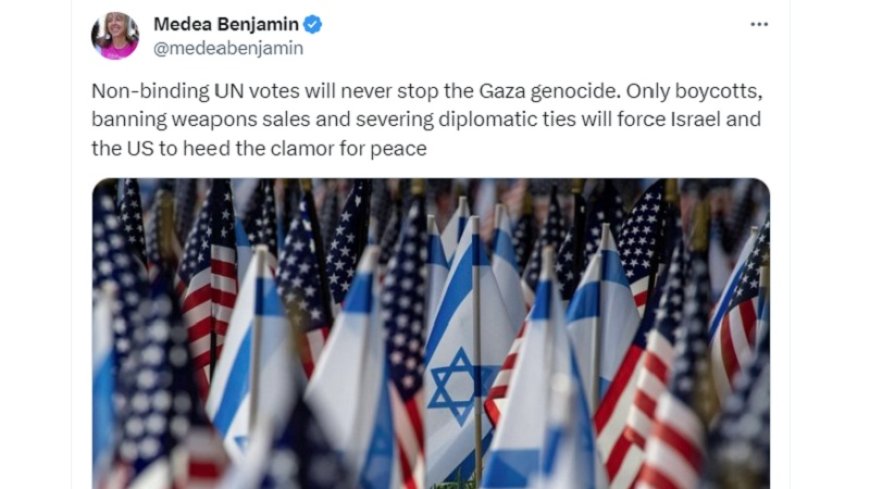US anti-war activists call for boycott of Israel
American anti-war activist Mehdi Benjamin posted on the SNS "X", saying, ``An unenforceable UN resolution will never stop the genocide of people in the Gaza Strip. The only way to draw attention to it is to impose an arms embargo and sever diplomatic relations."

In a previous version of this article, Daria Mateescu was mistakenly identified as a leader of the Columbia University Apartheid Divest. She actually leads the Columbia Law Students for Palestine. Over the past two months, large-scale protests against Israel's actions in Gaza have occurred globally, with hundreds of thousands of people participating from Jakarta to San Francisco. According to the Armed Conflict Location & Events Data Project, there were over 7,200 pro-Palestine protests in 118 countries and territories from October 7 to November 24. Many individuals have opted for economic activism by boycotting products and services supporting Israel, contributing to the Boycott, Divestment, and Sanctions (BDS) movement initiated by Palestinian civil society groups in 2005. This movement aims to challenge international support for what it terms Israeli apartheid and settler colonialism. In the United States, students, including those at Columbia University, have faced intimidation and censorship for speaking out against Israel's actions in Gaza. Daria Mateescu, a law student at Columbia, criticizes the university for not addressing student calls for divestment, free speech protection, and the reinstatement of suspended student groups. Mateescu highlighted that apart from protests, individuals are making consumer choices aligned with their beliefs, such as targeted boycotts of companies like McDonald's and Starbucks. There is a specific boycott list circulating on social media for local consumer choices in Colombia. In the UK, students at the University of York are also raising awareness about events in Palestine, emphasizing the importance of taking small actions, like not buying from certain chains, to contribute to the cause. The BDS movement, inspired by historical movements, seeks to address Israeli policies against Palestinians through consumer boycotts, divestment campaigns, pressure on brands, and grassroots boycotts. Companies linked to illegal Israeli settlements, as listed by the United Nations Human Rights Office in 2020, have faced scrutiny. Additionally, Professor Joseph Sonnenfeld of Yale University tracks major companies globally expressing support for Israel. The article emphasizes that the current global boycott against companies like McDonald's and Burger King is driven by grassroots campaigns rather than directly initiated by the BDS movement. The impact is felt by local franchise owners, with some distancing themselves from actions taken by their Israeli counterparts. The article also presents perspectives from individuals actively participating in the boycott, such as A'siah Abdalah, who emphasizes the importance of boycotting certain brands and checking the official BDS site for accurate information. Finally, it mentions that at least 30 of the listed companies supporting Israel made financial pledges, including major donations from entities like Michael Bloomberg, Jefferies, Blackstone, Salesforce, Boeing, Disney, and Johnson & Johnson.













































